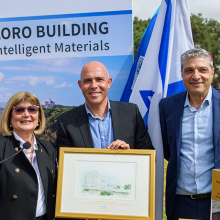A transformative new gift for exploring the limits of physics
Briefs

A visionary gift from André Deloro and his Adelis Foundation of France has established two major entities on campus that together promise to advance physics research in Israel, with worldwide impact.
The establishment of the André Deloro Institute for Space and Optics Research and the André Deloro Research School of Physical Science were celebrated at the International Board in a dedication event and a dinner at the David Citadel Hotel in Jerusalem on November 5.
Deloro, who died in 2012, gave generously throughout his life to a large number of causes in Israel, but remained anonymous in his giving, doing so through his foundation. (Adelis is an acronym for André Deloro Israel). Adelis previously made a major gift for joint brain research between the Weizmann Institute and the Technion, and to metabolic syndrome research at the Institute. The foundation also provided start-up funds for the lab of Dr. Oren Schuldiner of the Department of Molecular Cell Biology. “André provided us the tools to follow our dreams. He believed that the best way to provide for the security and future of Israel was through science and education,” Prof. Daniel Zajfman said at the dinner.
André Deloro was born in Cairo in 1933 and immigrated to France in 1950. He studied at the École Polytechnique and the École Nationale des Ponts et Chaussées (ParisTech) and become a world-class engineer. His first major project was the design and construction of an international port for export of liquefied natural gas in Algeria. The project that won him international recognition in his profession was creating a mega-hotel and business complex on the shifting sands of Saudi Arabia using engineering techniques that he developed. “My brother had an amazing intellectual capacity which he used, to fund major projects linked to Israel and his Jewish identity,” said his brother, Albert Deloro.
Prof. Zajfman described André as a builder who put great trust in people to help carry out his vision, and enabled cooperation between others. This was especially apparent, the President noted, when he found himself sharing a plane to Paris to see Mr. Deloro in 2012 along with the presidents of two Israeli universities: Prof. Peretz Lavie of the Technion, and Prof. Rivka Carmi of Ben-Gurion University. The three presidents presented André with the Weizmann Award in Science and the Humanities in May of that year, several months before his passing.
Prof. Zajfman recalls that Deloro had asked him for the Institute’s help in fulfilling his dreams for Israel in education, science, and security. “André told me that the Weizmann Institute has the tools to help Israel in all three of these areas: spaceHe said, ‘I want you to do this for me.’” Plans for the André Deloro Institute for Space and Optics Research and the André Deloro Research School of Physical Science were finalized after Deloro's death.
The Deloro Institute, said Prof. Oded Aharonson of the Department of Earth and Planetary Science, will enable the blossoming of the space and optics field in Israel. The Deloro Institute will combine 20 interdisciplinary groups dedicated to the study of light and the inner realm of matter and to exploring the universe in new ways, including participating in the planned Israeli ULTRASAT satellite, which will look outwards into space from Earth’s orbit to explore the ultraviolet spectrum and search for information on the supernova explosions that reveal secrets of the early universe and of how stars are born and die.
The André Deloro Research School of Physical Science is the final pillar of the five research schools built as a framework to provide a competitive edge for students at the Feinberg Graduate School at the Weizmann Institute. It creates a generous endowment that provides consistent support for graduate students in the physical sciences. This includes grants to students for personal research, books, computers, travel; and greater exposure to world leaders in their fields.
At the dinner celebrating Deloro’s legacy, Rebecca Boukhris, director of the Adelis Foundation, gave a sense of his remarkable vision and showed a film prepared by the Foundation that revealed his lifelong dedication to Israel.








